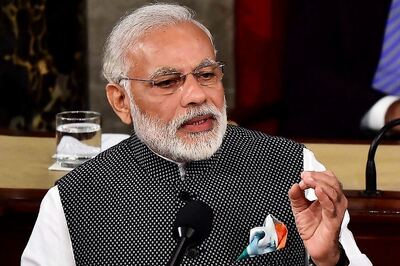
views
With India battling wave after wave of Covid-19 since March 2020, five tuberculosis (TB) advocates, among thousands of others, have been fighting the stigma around the disease and spreading awareness through a fun video song.
March 24 is recognised as World Tuberculosis Day.
THE IDEA
In the video released in December 2021, Harshita, Saba, Shabnam, Arti and Tanuja shake a leg to a song that essentially spreads awareness on tuberculosis and calls for the same attention and urgency with which Covid-19 is being dealt with.
While Tanuja and Shabnam are TB survivors, Saba and Arti have had close family members who contracted TB. The women also touch upon being shamed for having lived through the “dirty disease".
The idea for the ‘Gandi Ladki’ song originated from Harshita’s experience of dealing with trolls on social media for being vocal about ending TB. Harshita, a research scientist at Centre for Public Health Kinetics, New Delhi, started her “creative advocacy" in 2015, when she released her first song ‘I wanna stop TB’.
While she was working on her second song ‘Nikshay Anthem’ – around the time when Prime Minister Narendra Modi called for ending TB in India by 2025 – her social media account was compromised with hate comments about her advocacy work online.
“That is when I came up with ‘Tu kya TB rokegi, tu gandi ladki hai!’ and penned down the lyrics. After refining it, I felt that the song could be centred on the stigma, as TB is considered a dirty disease and women are disproportionately affected by it," Harshita told News18.
She then got in touch with Saba, Shabnam, Arti, and Tanuja from Touched by TB – a coalition of TB survivors or “TB champions" involved in raising awareness about the disease from lived experiences.
IMPACT OF STIGMA
Diagnostic delay in TB can lead to an increased period of infection, delayed treatment and increased severity of the disease, according to a study published in the Journal of Family Medicine and Primary Care.
“A person with TB, fearing discrimination, might be unable to seek help, leading to a delay in diagnosis. This delay exacerbates the disease. A person with TB, as a consequence of stigma, may drop out of treatment after diagnosis or have difficulties adhering to the long treatment regimen which may lead to drug resistance," said Harshita.
TB is a curable disease, especially when detected early. While pulmonary TB, which affects the lungs, is contagious, extra pulmonary TB (EPTB) is not. Yet, the UN health agency said that 1.5 million people worldwide died of the bacterial disease in 2020, a slight increase from the 1.4 million deaths in 2019, and India has the highest burden of the disease.
“People might know [they have TB] and not want to get tested," Raghavan Gopakumar, a healthcare consultant who has worked with the union health ministry and various state governments, including Uttar Pradesh, Jharkhand, and Uttarakhand, told News18.
Gopakumar also closely works with Touched by TB and was instrumental in bringing the five women in the video song together. He explained that the stigma, like the one related to Covid-19 in the early months, is because others need to avoid being physically close to the person with the disease. But, he said, even pulmonary TB stops being contagious after three weeks of taking medicines.
While pulmonary TB spreads through the air, it is important to note that once the treatment process has begun, the risk of infection, reduces significantly. If you are a caregiver for a person battling TB, don’t let your fear of infection come in the way of your support. pic.twitter.com/cebEi0XagX— Central TB Division | #TBMuktBharat (@TbDivision) March 22, 2022
“We need to destigmatise the disease," Gopakumar said, adding there is a gap among people’s knowledge of the curability of the disease and the spread. Further, workplaces may force employees diagnosed with TB to go on leave or quit and for women, there can be additional complications at home and in marriages, he said.
THE SURVIVOR
Tanuja, one of the champions from the video song, is testament to what the medical community says about stigma around TB. Having survived the disease twice, she not only had to deal with EPTB in her spinal cord, but also had to leave her job in an interior designing company. Despite the fact that EPTB is not contagious, Tanuja could not openly talk about it in her workplace. “I lied saying I have back pain," she said. After six months of diligently taking medicines, she got better.
However, the disease came back a second time, when she was in her mid-twenties. This was also when the medicines prescribed to her by a private sector doctor did not seem to be effective.
Tanuja then decided to get treated in a government hospital. She had to take one injection, along with a few other medicines every day for two months, during which period she suffered panic attacks and low self-esteem. “I was depressed. Nothing is worse than this disease," she said.
Tanuja has been involved in advocacy work for the past one year in Nehru Nagar TB Hospital, Delhi, where she also received her treatment. She guides and motivates TB patients in the hospital. “Hum unko samaj sakte hain."
One of the first steps to accelerate TB elimination in India by 2025, Harshita said, is to strengthen awareness campaigns.
“Stigmatising attitudes towards people with TB in the country remain high. This is perhaps because there has been an emphasis on awareness of TB without addressing the social aspect of stigma," the researcher said.
Harshita said, “We made India polio-free and we supported each other so strongly during the second Covid wave, similarly we should make everyone a strong TB advocate."
Read all the Latest News India and Breaking News here


















Comments
0 comment